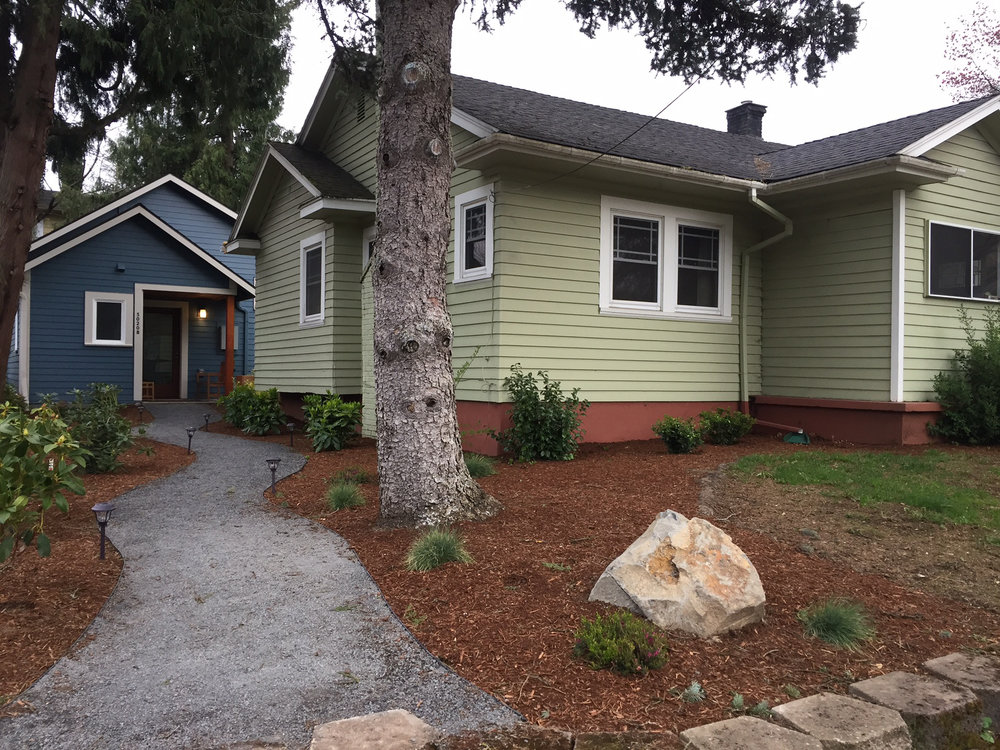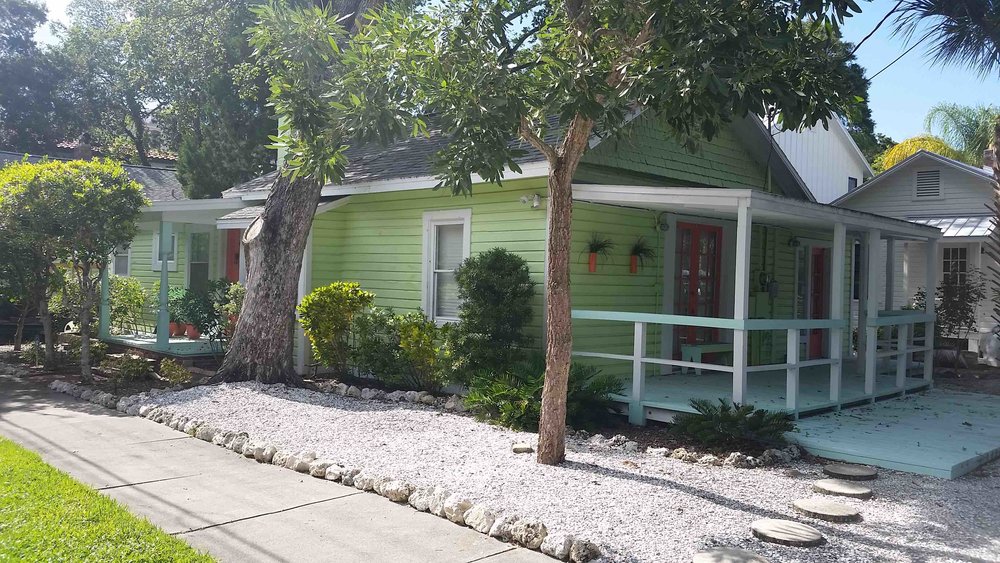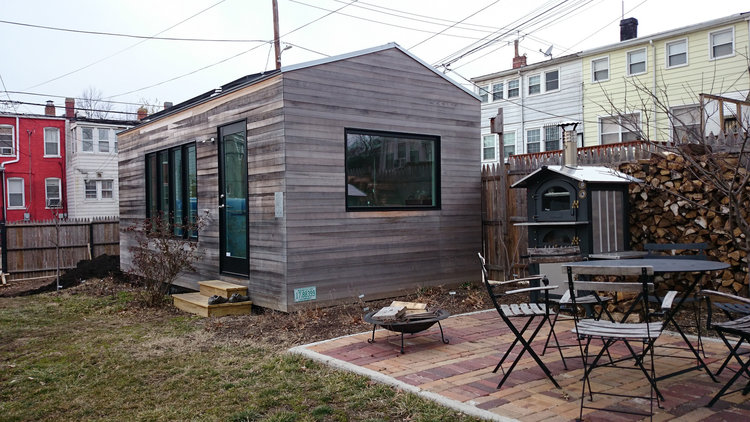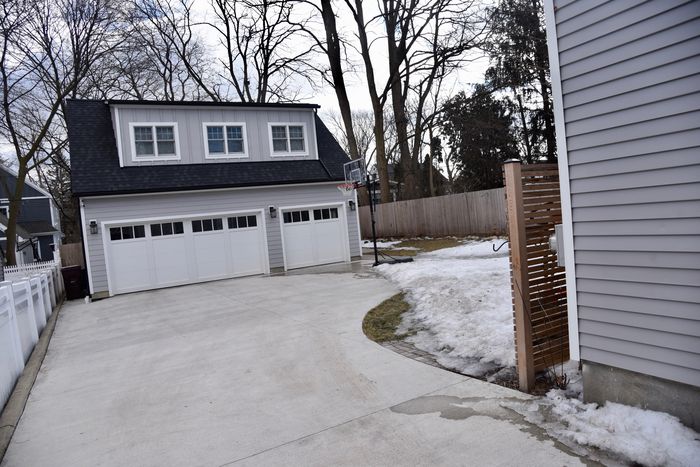DISCLAIMER: This blog is written by Marquette City Commissioner Evan Bonsall, who also serves as the Chair of the City of Marquette Ad Hoc Housing Committee. The views expressed in this blog are his own, and do not represent the views or imply the official endorsement of the Ad Hoc Housing Committee, the Marquette City Commission, or any of the individual members of the Ad Hoc Housing Committee or City Commission.
Q: What are Accessory Dwelling Units?
A: Accessory Dwelling Units (a.k.a., ADUs or “granny flats”) are small housing units that are typically built on properties on which a single-family home is already located. They are basically tiny homes that you can build in your backyard, on a side lot next to your house, on top of your garage, etc. (i) Because they are smaller than most single-family homes and many rental units, and are generally easier and cheaper to build than most other types of housing, ADUs can often be rented at prices that are affordable for working-class people.
(ii) Even more than other types of Missing Middle Housing, ADUs also have the added benefit of NOT changing the appearance, character, property values, or parking needs of existing neighborhoods. (iii) This makes ADUs a great way to meet the housing needs of households in the “workforce housing” income range of 80%-120% of the area median income (in the City of Marquette, about $35,000-$53,000 per year). (iv) For more information on ADUs, I would suggest checking out this article from Strong Towns and AccessoryDwellings.org. (v, vi)

Many years ago, ADUs were allowed (or at least, were not prohibited) in the City of Marquette – they weren’t called ADUs back then, but were usually referred to as “granny flats,” “garage apartments,” or “in-law apartments,” and they were a common source of housing for students, young professionals, and extended family members. My dad lived in an ADU in Marquette when he was a young, single police officer in the 1970s and ‘80s – there were quite a few ADUs in Marquette and most other American communities throughout the 20th century. (vii) At some point, they were prohibited by our City zoning code. Then, in 2019 the City approved a new Land Development Code (i.e., the zoning code), and among many other changes, it technically re-legalized ADUs in the City of Marquette. (viii) However, the new zoning code still imposed many zoning restrictions on ADUs, including:
– ADUs could not be occupied by more than 2 people (other rentals in the City can be occupied by up to 4 unrelated tenants, and by any number of family members);
– There were stringent setback, parking, and lot size requirements, making it hard to site ADUs on many residential lots in Marquette;
– The owner of an ADU had to live on the property where the ADU would be located;
– ADUs were limited to 750 square feet of floor area;
– ADUs had to be inspected annually instead of every 3 years like other rentals;
– In perhaps the most extreme example, ADU tenants had to be related to their landlord by blood or marriage. (ix)
ADUs were also defined as a “Special Land Use” in the new Land Development Code – this meant that, unlike “Permitted Land Uses” (a.k.a., “by-right” or “as-of-right” land uses), ADUs would have to go through a complicated (and often lengthy and expensive) special land use permitting process involving administrative review, a public hearing, and special approval from the Planning Commission. (x)
Taken together, these restrictions were essentially still a ban on ADUs in everything but name – indeed, virtually no ADUs were built in the 2 years after the new Land Development Code was approved. Thankfully, in January 2021 the Planning Commission and City Commission voted to ease the most extreme restrictions on ADUs, eliminating the requirement the ADU tenants be familial relations of their landlord, and limiting ADU occupancy to “2 unrelated individuals” rather than “2 persons,” which will allow families with more than 2 members to live in ADUs. (xi) However, while these changes have made ADUs easier to rent, they have not made them easier to actually build. Many restrictions on ADUs – some sensible, and some not – still remain on the books in the City of Marquette.
Q: What does the Housing Committee’s Initial Report say about ADUs?

A: The Ad Hoc Housing Committee has heard from many local, state, and national housing experts over the past year, and one of their most common suggestions was that the City ease restrictions on ADUs. (xii) The Housing Committee came to a consensus that it did not make sense to force potential ADU developers to jump through all the hoops required to obtain a special land use permit. After all, common sense tells us that we should not need a lengthy permitting process, a special public hearing, and a vote of the entire Planning Commission just so a homeowner can build a single housing unit of less than 750 square feet in their backyard. We already have many other requirements in place that will prevent any negative impacts from ADUs – why erect more barriers to ADUs that serve no purpose other than to make it a lot harder to build them?
As a result, in our Initial Report the Housing Committee recommended legalizing ADUs as “Permitted Uses” in every residential zoning district in the City. In other words, if you can build a traditional single-family home in a neighborhood in Marquette, you should be able to build an ADU in that neighborhood just as easily. While some sensible extra regulations will still be placed on ADUs, the Initial Report recommends that ADUs be treated more or less like single-family homes from a zoning and permitting standpoint. For what it’s worth, the Initial Report also makes the same recommendations about duplexes as for ADUs. (xiii)
The Housing Committee has also discussed the fact that it can be very hard to site ADUs on existing lots in the City given setback and off-street parking requirements. (xiv) The requirement that the owner of an ADU live on the same property where the ADU is located is also a significant limiting factor. The Housing Committee may discuss these issues further in the future. However, the changes that the City has already made to allow ADUs to actually be rented out and to be occupied by families with children, coupled with the Housing Committee’s recommendation that ADUs be legalized as regular permitted uses in every Marquette neighborhood, will hopefully lead to many new ADUs being developed in Marquette. With these changes, ADUs can finally begin to provide a meaningful increase in the supply of affordable “workforce housing” in Marquette.
If you have any questions, concerns, or ideas about ADUs or the Housing Committee’s Initial Report, suggestions for the Final Report, or any special knowledge or experience that you would like to share with the Committee, please reach out to me at [email protected] or (906) 236-0247. And don’t forget to check back here and on my Facebook page at www.facebook.com/evanbonsall4mqt for future housing-related blog posts!
Sources
(i) “Accessory dwelling units: what they are and why people build them.” AccessoryDwellings.org.
(ii) “Accessory Dwelling Units.” Planning.org, American Planning Association.
(iii) “Summing up ADU research: are accessory dwelling units as great, or as horrible, as people say?” AccessoryDwellings.org.
(iv) “Accessory Dwelling Units: A Smart Growth Tool for Providing Affordable Housing.” Ross, Jamie. Housing News Network, vol. 32, no. 2. August 2016.
(v) “If You’re Going to Allow ADUs, Don’t Make It So Hard to Build One.” Herriges, Daniel. Strong Towns, 11 September 2018.
(vi) AccessoryDwellings.org.
(vii) “Making Normal Neighborhoods Legal Again.” Herriges, Daniel. Strong Towns, 03 July 2019.
(viii) “Panel OKs land development code project.” Depew, Jaymie. The Mining Journal, 12 February 2019.
(ix) “Draft Land Development Code Amendments,” Marquette City Planning Commission Agenda, 20 October 2020, pp. 100-101. https://www.marquettemi.gov/wp-content/uploads/2020/10/102020.pc_.agenda.pdf
(x) Land Development Code, City of Marquette. https://www.marquettemi.gov/wp-content/uploads/2021/03/Effective-1-21-21-LDC-amended_updated-with-regulating-plan.pdf
(xi) January 11, 2021 Marquette City Commission Meeting Agenda. file:///C:/Users/Evan%20Bonsall/Downloads/Agenda_2021_1_11_Meeting(2068).pdf
(xii) “City of Marquette Ad-Hoc Housing Committee Initial Report of Findings.” Ad Hoc Housing Committee, City of Marquette. 15 January 2021.
(xiii) “City of Marquette Ad-Hoc Housing Committee Initial Report of Findings.” Ad Hoc Housing Committee, City of Marquette. 15 January 2021, pp. 9.
(xiv) “City of Marquette Ad-Hoc Housing Committee Initial Report of Findings.” Ad Hoc Housing Committee, City of Marquette. 15 January 2021. Appendix A: Meeting Minutes, “Official Proceedings of the Marquette Ad Hoc Housing Committee, March 10, 2020,” p. 3.


